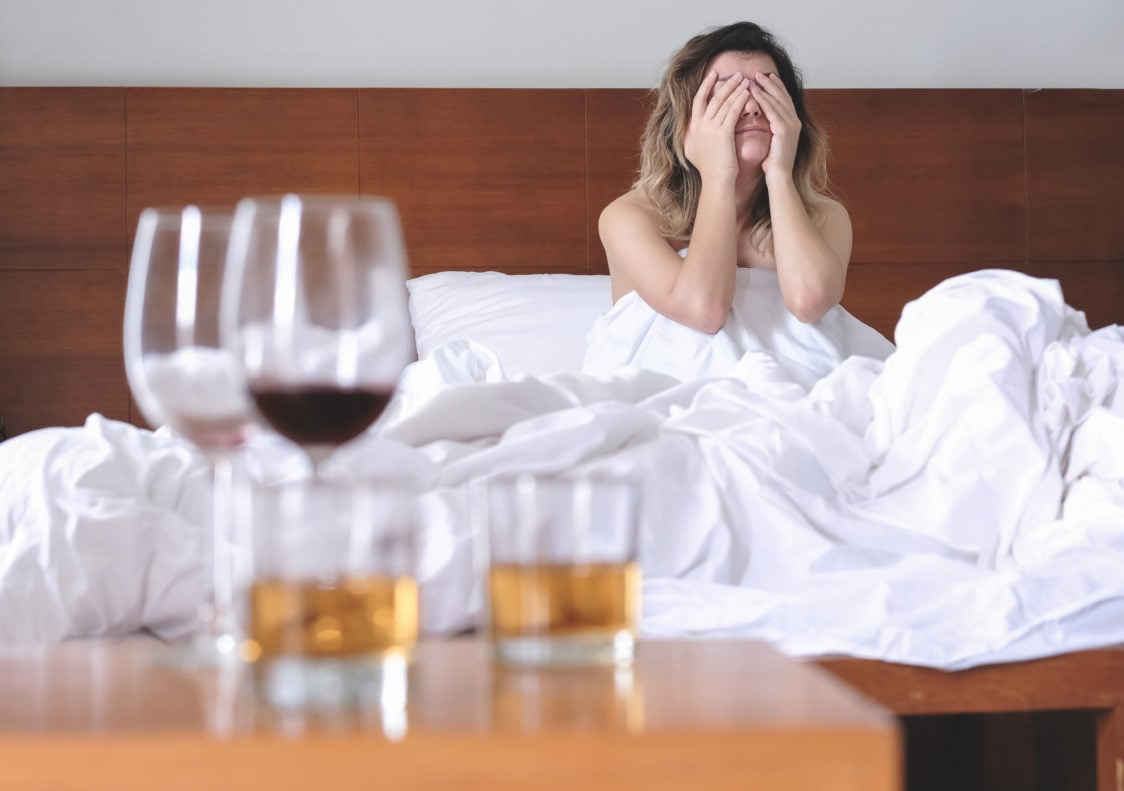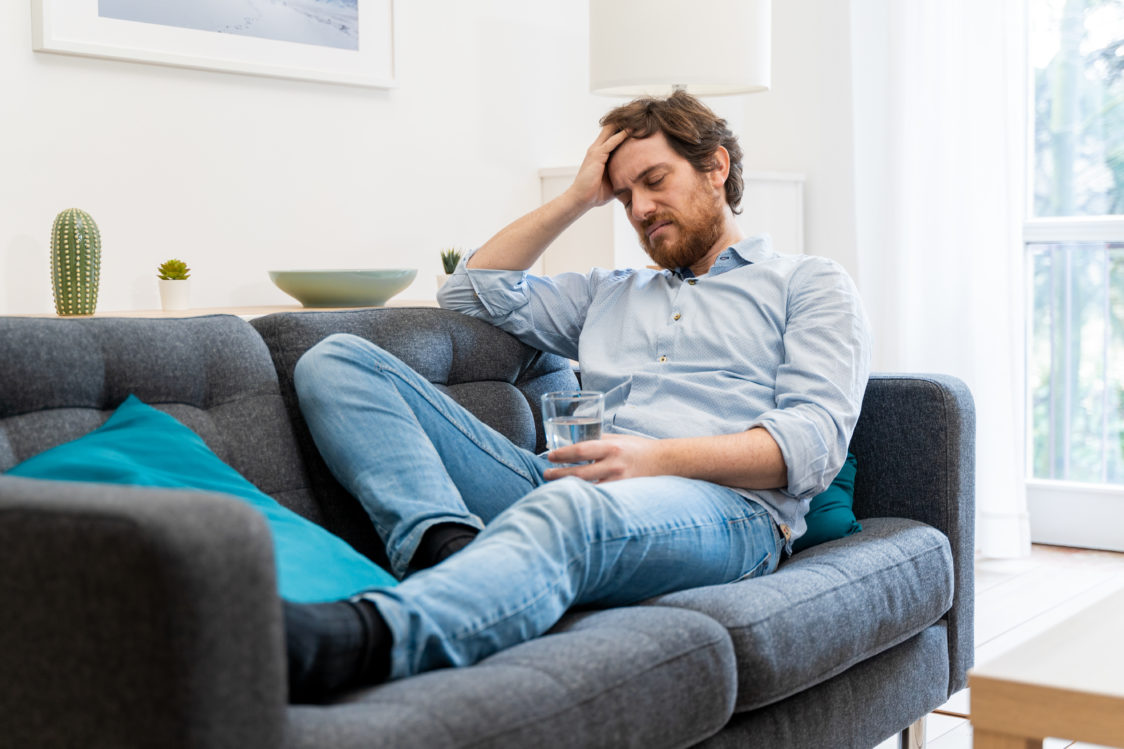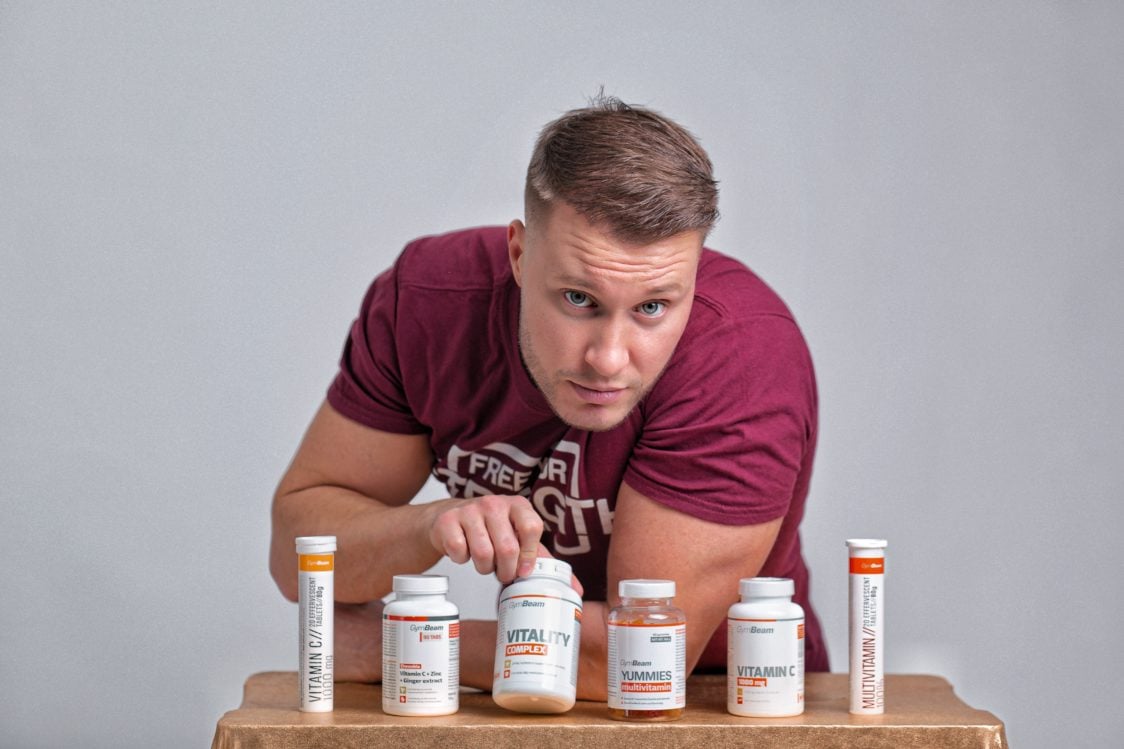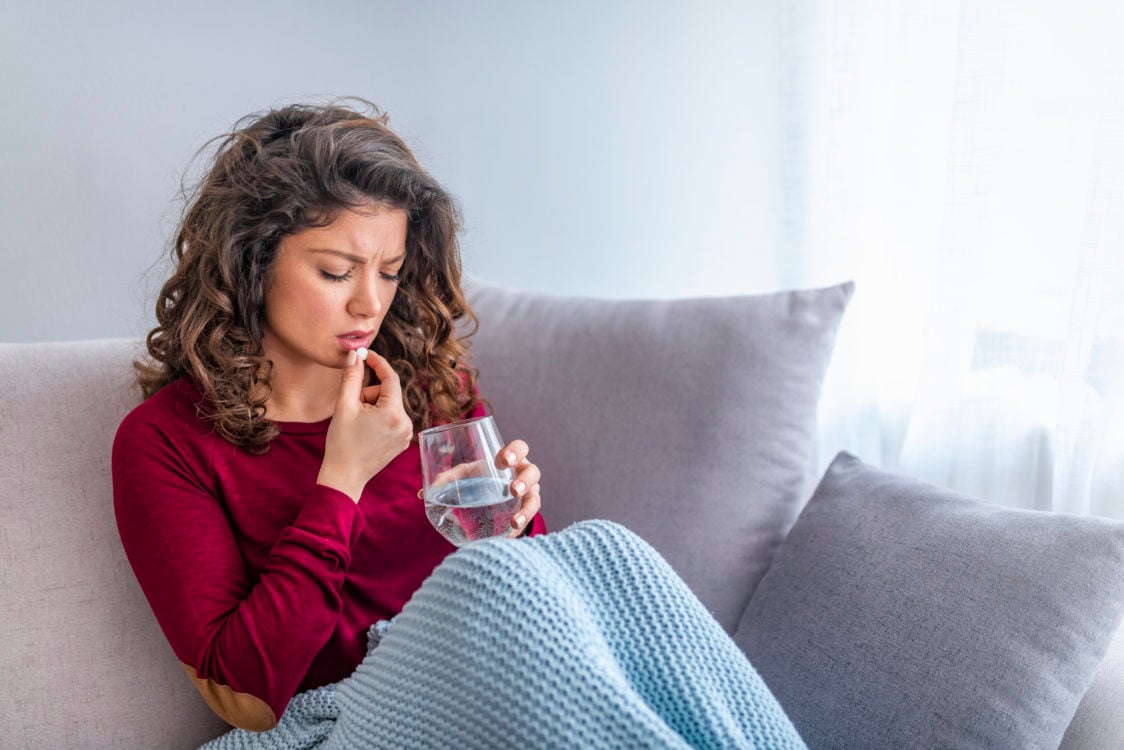Table of Contents
Celebrations of all kinds and other social events inevitably include some alcohol. We toast success, health and a happy new year with a glass of our favourite drink. But for most of us, the toast often doesn’t end there. Unfortunately, the cheerful mood and partying the night away will take its toll in the morning. Light-headedness in the morning, headaches and unbelievable thirst are among the most common symptoms. For the rest of the day, people often look for a way to get rid of the hangover as quickly as possible.
What is a hangover, and how does it arise?
It’s quite possible to wake up with a hangover after a boozy party. According to research, around 78% of people who have enjoyed a little more alcohol than is healthy the night before have experienced its symptoms. A number of factors are involved in its onset. The most common symptoms include fatigue, headaches, upset stomach and sometimes slight blackouts, which must then be monitored by other party-goers. What’s behind it, and why do you get hangover? [1]
1. Dehydration and electrolyte imbalance
Alcohol has the ability to reduce the level of antidiuretic hormone (ADH). This in turn causes the kidneys to excrete more water, leading to the need to visit the toilet more often. For example, if you drink a 250ml cocktail with 50g of alcohol, you can expect your body to excrete around 600-1000ml of urine. If you don’t top up your alcoholic drinks with a non-alcoholic drink now and then, dehydration is unlikely to pass you by. In addition to dry mouth and thirst, the symptoms include dark urine (dark yellow to orange in colour) and impaired brain function, for example in the form of poorer concentration. [2]
With more frequent visits to the toilet, you also lose more important electrolytes such as sodium, magnesium, potassium, or calcium. These are involved in maintaining optimal hydration, but also in the proper function of muscles, nerves, heart, and brain. For this reason, disrupting their balance often has a negative effect on how you feel the day after a party. [3]
If you’re wondering what dehydration can cause, you’ll find everything you need to know in our article How an Insufficient Water Intake Affects Your Health?

2. Breaking down alcohol
The elimination of alcohol (ethanol) from the body is mainly taken care of by our liver. Its cells produce an enzyme called alcohol dehydrogenase (ADH). This triggers the conversion of ethanol into acetaldehyde, which has toxic effects on the body. [4]
Acetaldehyde can thus be identified as the main culprit in headaches, nausea and other symptoms of hangovers. Fortunately, we are equipped with another enzyme – acetaldehyde dehydrogenase (ALDH), which takes care of its breakdown into inactive acetic acid. [4]
However, some people have a reduced ability to produce the enzymes ADH and ALDH due to a genetic variation. Acetaldehyde is thus typically less easily broken down, which can result in lower overall alcohol tolerance. Perhaps you have a friend who is considerably more cheerful after one drink than the rest of the group. There are even racial differences in alcohol breakdown. Just for the record, about 50% of the population living in the East Asian region has impaired or reduced ALDH production. [5]
3. Drinking alcohol on an empty stomach
You’ve probably also heard the old adage from someone: “Eat well before you drink.” If you took their advice, you can thank them for a more pleasant morning the next day. Drinking on an empty stomach is not a good idea.
Alcohol is absorbed into the bloodstream more quickly, which can result in abdominal pain, nausea and generally more severe hangover symptoms. It’s not a bad idea to eat dinner before a planned party, or to snack on nibbles and other goodies that are on hand during the evening. [6]

4. Deceitful congeners
Congeners are substances that give some alcoholic beverages their typical taste and aroma. Unfortunately, they have similar toxic effects on the body as ethanol. For this reason, they are often associated with worse hangovers. Thus, typically more severe headaches, nausea, or fatigue. If you’ve ever overdone it with rum, brandy, whiskey or cognac, you may know what we’re talking about. These are the drinks that have the highest levels of dangerous congeners. [6-7]
5. Impaired sleep quality
Getting a good sleep is probably the last thing you expect after a night out. Even if you do manage to get the recommended 7-9 hours of sleep, the quality of it probably won’t be ideal. Alcohol can make it difficult to get the deep sleep you need. As a result, you’re unlikely to feel fully rested when you wake up, and fatigue and sleepiness will keep you company for the rest of the day. [8]
Poor quality sleep can also throw off your hormone levels. It can increase ghrelin (the hunger hormone) and decrease leptin (the satiety hormone). This is perhaps why many people get really hungry the day after a party. Their growling stomach then tries to satisfy itself with typically high-calorie foods that are high in fat and salt. In this case, eggs and bacon are far more appealing than porridge with fruit. [9]
If you often have trouble sleeping, read our article How to Fall Asleep Quickly? Try Our Simple Tips for a Better Sleep.

6. Negative effect on the immune system
Alcohol can also mess with your immune system. In fact, a number of studies have revealed that people with hangovers often have elevated levels of pro-inflammatory cytokines. These substances typically increase in the body when fighting an infection. They typically cause muscle and head pain, fatigue, nausea, and irritability. [10-12]
As the amount of ethanol (alcohol) in the body increases, the levels of the aforementioned cytokines typically increase as well. When alcohol is broken down in the body, harmful free radicals are also produced, which can cause oxidative stress. This is also often associated with hangover symptoms. [10-12]
Wondering how to boost your immunity? Popular ways include cold water therapy and other practical tips, which you can find in our article 15 Ways to Boost Your Immune System and Protect Your Health.
When does a hangover go away and how long does it typically last?
You may start to notice the first signs of a hangover six to eight hours after you have had your last drink. This is the sobering up period, when the alcohol has already been eliminated from the body. You will then have to wait about 20-24 hours for the hangover to fully subside. However, it all depends on many factors such as the type and amount of alcohol consumed, genetic makeup, metabolic rate, as well as body weight and height.
However, if you go from party to party, as is typical between Christmas and New Year’s Eve, it may take a little longer to get completely back to normal. You may well face a hangover of several days, after which you vow never to drink again. [1-2]

10 ways to get rid of or prevent a hangover
There are countless guaranteed tips around the world on how to get rid of a hangover as quickly as possible. Some people swear by drinking coffee or cola and others seek salvation in broths or fatty foods. What really works?
1. You can reduce the severity of your hangover during the evening by choosing drinks with lower congener levels
If you want to avoid a hangover altogether, ideally don’t drink, or keep the number of drinks you have to a minimum. When choosing a particular drink, you should reach for one with a lower congener content. Stay with one type of drink throughout the evening. Also, try not to overdo it with champagne or prosecco. These popular drinks contain bubbles that can speed up the absorption of alcohol. [13]
Drinks with a higher congener content usually mean a heavier hangover
Drinks with a lower congener content | Drinks with a higher congener content |
|---|---|
| vodka, gin, light rum, white wine, light beer, other clear spirits | bourbon, brandy, whisky, cognac, dark rum, red wine |
Try to dilute the alcohol as much as possible and substitute it with water, juice or another non-alcoholic drink. Make sure you eat well before you go to the party, and it doesn’t hurt to eat something during the party either. When you get home, drink a big glass of fresh water before you go to bed. You can add a little salt or electrolytes to your water to help hydrate and keep your body’s fluid levels replenished. [13–14]
2. Try to get enough sleep
Leaving a great party a little early can be a big sacrifice for some, but it’s often worth it. If you want to function normally the next day, you should get a good night’s sleep. For at least seven hours. Alcohol may not result in the same quality of sleep, but it’s still better than no sleep at all or only a few hours. If you can, have a nap during the day. This will give your body a chance to focus on repairing the damage done by alcohol. [15]
If you are wondering what other consequences insufficient sleep can have, read our article What Happens to Your Body When You Don’t Sleep Enough?

3. Eat when you wake up
If you are in no condition to retain as much water as possible, try to eat when you wake up. Maybe you’re craving something really fatty and calorie-dense and want to eat pizza, fries with mayonnaise or eggs and bacon straight away. But such a heavy meal could irritate your stomach and make your hangover worse. Try a ham and cheese pastry, an egg without bacon or yoghurt and granola instead. If you wake up at lunchtime, a bowl of warm meat and vegetable broth will definitely do you good. This will replenish important nutrients as well as electrolytes that a tired body craves.
When you have a protein rich meal or protein drink on its own, you provide your body with the amino acid cysteine, which is commonly used on its own to reduce hangover symptoms. It is involved in the breakdown of toxic acetaldehyde. In addition, it also supports the production of the antioxidant glutathione, which helps the body fight oxidative stress. Carbohydrates from cereals or baked goods, in turn, help bring blood sugar levels back to normal, which may be low due to alcohol. [14, 16]
If you’re feeling up to making a comprehensive healthy breakfast and wondering what it should contain, check out our article The 6 Most Common Breakfast Mistakes and How to Fix Them?

4. Replenish fluids and electrolytes
After drinking a large amount of alcohol, your body is probably dehydrated. So what to drink when hungover? During the day, try to drink fresh water or herbal teas (mint, chamomile). These can also help with nausea and other digestive problems associated with a hangover. Coca-Cola or Sprite can also be a good option for a hangover. According to studies, these drinks can even affect the production of the enzyme that breaks down acetaldehyde. [17-18]
It is also advisable to add electrolytes to the drink for optimal water retention. Increase sodium intake with salty food, supplement potassium with a banana and magnesium with dark chocolate or dietary supplements. A more comprehensive solution is a supplement containing all the electrolytes, which you can simply drink down with water. [18–19]
5. Focus on vitamins and minerals
Some vitamins and minerals can help you get through a busy day in the grip of a hangover a little easier.
- Vitamín B3 a zinek se například účastní metabolických procesů, které mají na starost odbourávání alkoholu.
- Vitamin C a selenium, thanks to their antioxidant effects, can help protect the body from oxidative stress.
- Drinking alcohol can lead to impaired absorption of vitamins B1, B9 and B12. For this reason, these substances are also added to dietary supplements to alleviate hangover symptoms.
You can take all these micronutrients separately or in the form of complex multivitamin supplements, which in one or two tablets are an easy solution to get these substances into your body quickly. [20–23]

6. Try ginger or ginseng extract
Many plants and herbs contain a wide range of antioxidants, vitamins, and minerals. For this reason, they are also traditionally used in the form of teas or dietary supplements to alleviate the symptoms of hangovers. Their effects have also been proven in studies. [24]
According to one of them, ginger can bring relief from nausea and other digestive problems associated with hangover. You can make a strong tea from it or try a more concentrated ginger shot that’s guaranteed to get you back on your feet. You can also make a tea from it, just pour the contents into a mug and pour over with hot water. [24]
Other active ingredients include ginseng (Panax ginseng), which according to studies can boost alcohol metabolism and, thanks to its antioxidant properties, also neutralise the free radicals that are often produced during this process. [24]
If you want to learn more about the effects of ginger, read our article How Can Ginger Improve Your Health and Help You Lose Weight?
7. Give your body and mind a caffeine boost
A cup of coffee won’t miraculously cure you of a hangover, but its effects will at least wake you up and cheer you up. Besides, it also contains a number of powerful antioxidants, so you don’t have to deny yourself after the party. But be sure not to overdo it, and if you drink it black, without milk, you’d better eat beforehand. Strong black coffee can irritate an empty stomach. [18, 25]
Stick to the recommended maximum of 400 mg of caffeine per day and replace coffee with mint or chamomile tea in the evening. After all, you want to get a good night’s sleep the next night and make up for the sleep deficit from the night before. If you’re not a coffee drinker, you can also find caffeine in black and green tea, matcha or your some BCAA drink. [18, 25]
If you are interested in what coffee has to offer, you should not miss our article Is Coffee Healthy? 7 Reasons Why You Should Give It a Chance.

8. Go for a walk
Other proven tips for hangovers include exercise. Instead of watching Netflix all day, head out for a walk and you’ll find that you’ll feel much better afterwards. By getting your body moving, you’ll boost your metabolism and flush out endorphins that will at least improve your mood a little. If you feel up to it, try stretching, yoga, a short run or light strength training. And don’t forget to drink enough water. [26]
A sports water bottle can help you with this. Pour in some water and add a scoop of BCAAs or enrich it with maltodextrin for energy. On a day when you’re feeling tired, are likely to be dehydrated and have slower reactions, it might not be the best idea to hit the gym to try squatting with heavier weights. This is because you could easily injure yourself and your performance won’t exactly be world-class. [26]
If you’re wondering how alcohol can affect more than just athletic performance, read our article How Does Alcohol Affect Weight Loss, Recovery and Muscle Growth?
9. As a last resort, use medication
Many people with hangovers automatically reach for acylpyrine, ibalgin or other painkillers when they wake up. At that time, however, they may still have alcohol in their bloodstream, which should not be combined with medication. It could cause liver damage or stomach irritation. [27-28]
For this reason, it is usually recommended to wait until at least twelve hours have passed since the last drink. If it is really necessary, take aspirin, ibuprofen or another drug from the group of non-steroidal analgesics. As well as the pain, these will help to suppress the body’s inflammatory response to alcohol. If you have heartburn, try baking soda to help reduce stomach acidity. [27-28]

10. There is no miracle hangover cure
Maybe you’ve heard the phrase, “What you’ve done wrong, makes it right.” Does this mean that the same drink you drank the night before might help with a hangover? [6]
I think you’re going to be disappointed. Beer, rum or vodka won’t cure a hangover. Rather, you will postpone it until later, when it may surprise you in an even stronger form. Better to stick to a glass of fresh water and a cup of coffee. [6]
What should you remember?
It is the dream of many people to enjoy a birthday party or the arrival of a new year without suffering from hangover the next day. If you follow a few simple rules, I believe you can do it. Instead of trying several types of cocktails, stick to one cocktail that you’ll mix with water in between drinks. Eat well before drinking alcohol and drink a lightly salted pint of water before bed.
In the morning, instead of aspirin, reach for a dietary supplement with electrolytes and vitamins. If your condition allows, eat and remember to replenish fluids throughout the day. Non-alcoholic, of course. Rest, but give light exercise a chance. You’ll find that this time you’ll get over the hangover a lot easier and won’t be driven to false promises like lifetime abstinence from alcohol.
If you liked our article, don’t forget to share it with your friends. Be rest assured that they will appreciate the advice.
[1] Ye, R., & Ye, R. Hangover Syndrome: Pathogenesis and Treatment. – https://doi.org/10.23937/2690-263X/1710009
[2] The science of a hangover. – https://www.rte.ie/brainstorm/2017/1218/928206-the-science-of-a-hangover/
[3] Hydration for Hangover: Which Electrolytes to Replenish? Adapted Nutrition. – https://adapted-nutrition.com/blogs/news/hydration-for-hangover-which-electrolytes-need-to-be-replenished
[4] The Alcohol Pharmacology Education Partnership. How is Alcohol Eliminated from the Body? – https://sites.duke.edu/apep/module-1-gender-matters/content/content-how-is-alcohol-eliminated-from-the-body/
[5] myDr. Liver and alcohol breakdown. – https://www.mydr.com.au/liver-and-alcohol-breakdown/
[6] Magazine, S., & Stromberg, J. Your Complete Guide to the Science of Hangovers. Smithsonian Magazine. – https://www.smithsonianmag.com/science-nature/your-complete-guide-to-the-science-of-hangovers-180948074/
[7] Rohsenow, D. J., Howland, J., Arnedt, J. T., Almeida, A. B., Greece, J., Minsky, S., Kempler, C. S., & Sales, S. Intoxication with bourbon versus vodka: Effects on hangover, sleep, and next-day neurocognitive performance in young adults. – https://doi.org/10.1111/j.1530-0277.2009.01116.x
[8] The Effects of Alcohol on Quality of Sleep. – https://www.ncbi.nlm.nih.gov/pmc/articles/PMC4666864/
[9] Leproult, R., & Van Cauter, E. Role of Sleep and Sleep Loss in Hormonal Release and Metabolism. – https://doi.org/10.1159/000262524
[10] Effects of alcohol hangover on cytokine production in healthy subjects. – https://doi.org/10.1016/j.alcohol.2003.09.003
[11] Das, S. K., & Vasudevan, D. M. Alcohol-induced oxidative stress. – https://doi.org/10.1016/j.lfs.2007.05.005
[12] van de Loo, A. J. A. E., Mackus, M., Kwon, O., Krishnakumar, I. M., Garssen, J., Kraneveld, A. D., Scholey, A., & Verster, J. C. The Inflammatory Response to Alcohol Consumption and Its Role in the Pathology of Alcohol Hangover. – https://doi.org/10.3390/jcm9072081
[13] NHS. Hangover cures. – https://www.nhs.uk/live-well/alcohol-support/hangover-cures/
[14] BBC Good Food. How to cure a hangover. – https://www.bbcgoodfood.com/howto/guide/how-cure-hangover
[15] Fuel. Electrolytes and Hangovers. – https://ataqfuel.com/blogs/ataq-fuel-news/electrolytes-and-hangovers
[16] Eriksson, C. J. P., Metsälä, M., Möykkynen, T., Mäkisalo, H., Kärkkäinen, O., Palmén, M., Salminen, J. E., & Kauhanen, J. L-Cysteine Containing Vitamin Supplement Which Prevents or Alleviates Alcohol-related Hangover Symptoms: Nausea, Headache, Stress and Anxiety. – https://doi.org/10.1093/alcalc/agaa082
[17] Wang, F., Zhang, Y.-J., Zhou, Y., Li, Y., Zhou, T., Zheng, J., Zhang, J.-J., Li, S., Xu, D.-P., & Li, H.-B. Effects of Beverages on Alcohol Metabolism: Potential Health Benefits and Harmful Impacts. – https://doi.org/10.3390/ijms17030354
[18] Harvard Health. 7 steps to cure your hangover. – https://www.health.harvard.edu/staying-healthy/7-steps-to-cure-your-hangover-and-ginkgo-biloba-whats-the-verdict
[19] Hangover treatment: MedlinePlus Medical Encyclopedia. – https://medlineplus.gov/ency/article/002041.htm
[20] Dietary Nutrient Intake, Alcohol Metabolism, and Hangover Severity. – https://www.ncbi.nlm.nih.gov/pmc/articles/PMC6780234/
[21] Psychology Today. Some Vitamins and Minerals May Reduce Alcohol Toxicity. – https://www.psychologytoday.com/us/blog/integrative-mental-health-care/201901/some-vitamins-and-minerals-may-reduce-alcohol-toxicity
[22] Moldowan, M. J., & Moldowan, C. Composition and method for reducing hangover – https://patents.google.com/patent/US4496548A/en
[23] Does Alcohol Cause Nutrient deficiency? Vitamins & Benefits. – https://www.medicinenet.com/alcohol_and_nutrition/article.htm
[24] Wang, F., Li, Y., Zhang, Y.-J., Zhou, Y., Li, S., & Li, H.-B. Natural Products for the Prevention and Treatment of Hangover and Alcohol Use Disorder. – https://doi.org/10.3390/molecules21010064
[25] Coffee and Health. Coffee and hangovers: Coffee has been suggested as a potential remedy for hangovers in the popular media, but is this really the case? – https://www.coffeeandhealth.org/news/coffee-and-hangovers-coffee-has-been-suggested-as-a-potential-remedy-for-hangovers-in-the-popular-media-but-is-this-really-the-case/
[26] Nelson, L. Should you exercise on a hangover? – https://www.healthhp.com.au/post/should-you-exercise-on-a-hangover
[27] Aspirin & Alcohol (Interactions & Risks). – https://alcoholrehabhelp.org/interactions/aspirin/
[28] Baking soda for acid reflux: Effectiveness, risks, and side effects. – https://www.medicalnewstoday.com/articles/314932


Add a comment